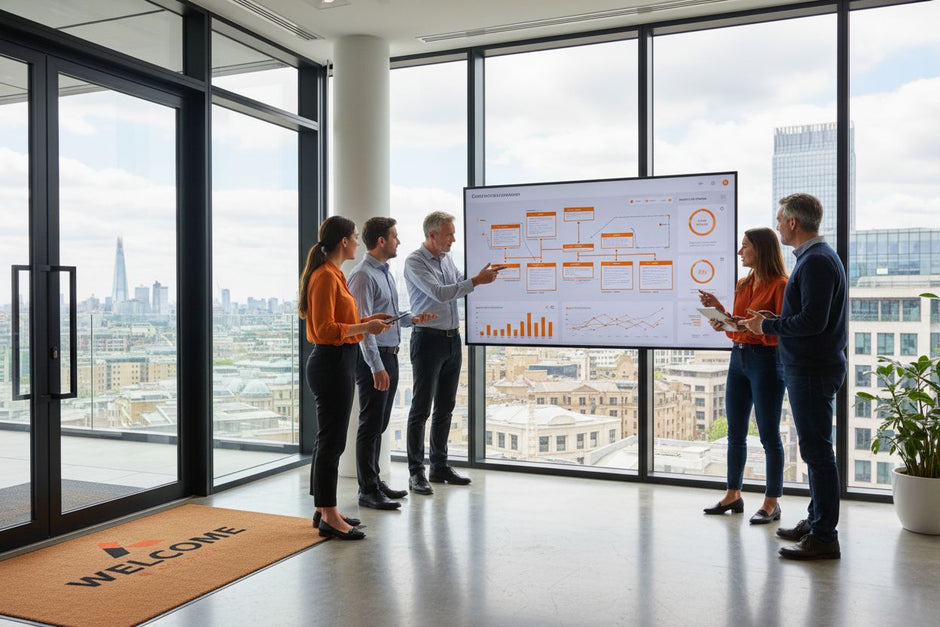
Sustainable workplace practices are reshaping how businesses think and operate every day. It is not just about planet-friendly gestures and good public relations. Companies that prioritise sustainability often see operational costs fall, sometimes saving up to 20 percent on energy bills alone. Yet the real surprise is this. The biggest impact is often not seen in spreadsheets but in happier, healthier, and more productive teams.
Table of Contents
- Why Sustainable Workplace Practices Matter
- Practical Steps For Greener Workplaces
- Products And Solutions That Make A Difference
- Engaging Teams In Workplace Sustainability
Quick Summary
| Takeaway | Explanation |
|---|---|
| Sustainability is a business imperative | Implementing sustainable practices is essential for long-term growth and stakeholder satisfaction in modern organisations. |
| Focus on energy and waste management | Conduct energy audits and adopt circular economy principles to reduce operational costs and environmental impact. |
| Engage employees through education | Create green teams and implement training to empower staff participation in sustainability initiatives. |
| Utilise innovative technologies | Invest in smart building technologies and renewable energy to enhance environmental performance and reduce costs. |
| Recognise and incentivise contributions | Implement reward systems that celebrate individual and team efforts in achieving sustainability goals. |
Why Sustainable Workplace Practices Matter
Sustainable workplace practices have transformed from optional strategies to critical business imperatives in the modern corporate landscape. As global environmental challenges intensify and stakeholders demand greater corporate responsibility, organisations are recognising that sustainability is not just an ethical choice but a strategic necessity for long-term success.
Environmental and Economic Implications
The interconnection between workplace sustainability and organisational performance has become increasingly apparent. The Occupational Safety and Health Administration highlights that sustainable practices do more than protect the environment. They actively contribute to worker health, safety, and organisational resilience. By implementing comprehensive sustainability strategies, businesses can simultaneously reduce operational costs, minimise environmental impact, and create more engaged, productive work environments.
Beyond environmental considerations, sustainable workplace practices generate substantial economic benefits. Companies that prioritise sustainability often experience reduced energy consumption, lower waste management expenses, and improved resource allocation. These strategic approaches not only decrease operational expenditures but also enhance brand reputation and attract environmentally conscious talent and customers.
Social and Organisational Impact
Workplace sustainability extends far beyond environmental metrics. It encompasses creating inclusive, healthy, and supportive work environments that prioritise employee well-being and professional development. Modern employees increasingly seek employers who demonstrate genuine commitment to sustainable practices and social responsibility.
Research indicates that organisations with robust sustainability frameworks experience higher employee engagement, reduced turnover rates, and improved overall organisational performance. By integrating sustainable workplace practices, businesses signal their commitment to progressive values, which resonates with emerging workforce generations who prioritise meaningful work and ethical corporate behaviour.
Strategic Business Transformation
Sustainable workplace practices represent a fundamental reimagining of traditional business operations. They require holistic approaches that integrate environmental considerations, social responsibility, and economic pragmatism. This transformation involves redesigning workplace processes, adopting innovative technologies, and cultivating a corporate culture that values sustainability as a core strategic objective.
Companies that successfully implement comprehensive sustainable practices position themselves as industry leaders. They demonstrate adaptability, forward-thinking management, and a commitment to creating positive societal impact. By viewing sustainability not as a compliance requirement but as a strategic opportunity, organisations can unlock innovative potential, drive competitive advantage, and contribute to global environmental conservation efforts.
The journey towards sustainable workplace practices is continuous and evolving. It demands ongoing commitment, strategic investment, and a willingness to challenge existing operational paradigms. As global environmental challenges become increasingly complex, businesses that proactively embrace sustainability will be best equipped to navigate future uncertainties and create lasting, positive change.
Practical Steps for Greener Workplaces
Transforming workplace sustainability from conceptual strategy to tangible implementation requires systematic, measurable approaches that organisations can readily adopt. These practical steps not only reduce environmental impact but also create more efficient, cost-effective operational models.
Energy and Resource Management
Energy consumption represents a critical area for sustainable workplace practices. The Carbon Trust recommends comprehensive energy audits as the foundational step for workplace sustainability. These assessments help organisations identify specific areas of energy waste and develop targeted reduction strategies.
Practical energy management techniques include implementing smart power management systems, upgrading to energy-efficient equipment, and encouraging employee behaviours that minimise unnecessary power consumption. LED lighting, motion-sensor systems, and programmed computer shutdowns during non-operational hours can significantly reduce overall energy expenditure. Organisations might consider investing in renewable energy sources like solar panels or purchasing green energy credits to offset their carbon footprint.
Waste Reduction and Circular Economy Principles
Waste management represents another crucial domain for sustainable workplace practices. The Ellen MacArthur Foundation emphasises the importance of circular economy principles, which focus on designing out waste and keeping materials in use. This approach involves rethinking traditional linear consumption models and creating systems that prioritise recycling, reuse, and resource regeneration.
Workplaces can implement waste reduction strategies such as comprehensive recycling programmes, digital document management to reduce paper consumption, and partnering with suppliers who embrace sustainable packaging solutions. Encouraging reusable containers, implementing composting systems, and creating clear waste segregation protocols can dramatically reduce an organisation’s environmental impact. Additionally, businesses can explore innovative solutions like electronic waste recycling programmes and partnering with local recycling facilities.
Technology and Infrastructure Transformation
Technological innovations offer powerful tools for creating greener workplaces. Cloud computing, remote work technologies, and smart building management systems enable organisations to reduce physical infrastructure requirements and minimise environmental footprint. Video conferencing and collaborative digital platforms can significantly reduce travel-related carbon emissions while maintaining productive communication channels.
Infrastructure upgrades present substantial opportunities for sustainability. This might include installing energy-efficient heating and cooling systems, using sustainable building materials during renovations, and creating green spaces within workplace environments. Organisations can also invest in electric vehicle charging stations, bicycle storage facilities, and other infrastructure that supports environmentally friendly transportation options for employees.
Implementing these practical steps requires a holistic approach that combines technological innovation, employee engagement, and strategic planning. Successful green workplace transformations are not about perfect implementation but consistent, incremental improvements. By breaking down sustainability goals into manageable, actionable steps, organisations can create meaningful change that benefits both the environment and their operational efficiency.
Here is a checklist table outlining practical workplace sustainability actions mentioned, with a simple status column for organisations to track their implementation.
| Action | Status (Complete/In Progress/To Do) |
|---|---|
| Conduct an energy audit | |
| Upgrade to energy-efficient equipment | |
| Encourage employee energy-saving behaviours | |
| Implement recycling and waste segregation | |
| Reduce paper use via digital document management | |
| Partner with sustainable suppliers | |
| Install renewable energy sources (e.g., solar) |
Continuous monitoring, regular assessment, and a commitment to ongoing improvement are essential. Organisations should establish clear metrics, track progress, and remain adaptable to emerging sustainable technologies and practices. The most effective green workplace strategies are those that view sustainability not as a destination, but as an ongoing journey of innovation and responsible business practices.
Products and Solutions That Make a Difference
The journey towards sustainable workplace practices is significantly enhanced by innovative products and solutions designed to minimise environmental impact while maximising operational efficiency. Modern businesses have an unprecedented array of technological and material innovations at their disposal to transform their environmental footprint.
To help readers quickly compare major categories of sustainable workplace solutions discussed in this article, here is a summary table outlining their focus areas and main benefits.
| Solution Category | Main Focus | Key Benefits |
|---|---|---|
| Smart Building Technologies | Regulating energy and resource use via automation | Lower energy costs, increased efficiency |
| Sustainable Material Solutions | Using eco-friendly, recycled, or renewable materials | Reduced ecological impact, improved workspace health |
| Renewable Energy & Carbon Reduction | Adopting solar, wind, and carbon offset schemes | Lower emissions, long-term energy savings |
Smart Building Technologies
The National Renewable Energy Laboratory highlights the critical role of advanced technological solutions in reducing commercial building energy consumption. Smart building technologies represent a sophisticated approach to workplace sustainability, integrating intelligent systems that optimise resource utilisation and environmental performance.
Intelligent building management systems can autonomously regulate heating, cooling, lighting, and electrical systems based on real-time occupancy and environmental conditions. These technologies use sophisticated sensors and machine learning algorithms to create dynamic, responsive workplace environments. For instance, advanced HVAC systems can adjust temperature zones precisely, reducing unnecessary energy expenditure. Automated lighting controls that respond to natural light levels and occupancy can dramatically reduce electricity consumption without compromising workplace comfort.
Sustainable Material Solutions
Beyond technological interventions, sustainable material choices play a crucial role in creating environmentally responsible workplaces. Innovative materials are emerging that offer superior performance while minimising ecological impact. Recycled and upcycled office furniture, carpeting made from reclaimed plastics, and construction materials derived from renewable resources represent tangible examples of sustainable material innovation.
Companies are increasingly exploring bio-based materials that provide comparable or superior performance to traditional alternatives. Bamboo-based products, for example, offer exceptional durability and rapid renewability compared to traditional wood sources. Low-emission paints, recycled metal furnishings, and energy-efficient electronic equipment demonstrate how material selection can contribute significantly to workplace sustainability.
Renewable Energy and Carbon Reduction Solutions
Renewable energy solutions have transformed from alternative options to mainstream business strategies. Solar panel installations, wind energy partnerships, and on-site renewable energy generation provide organisations with opportunities to reduce carbon emissions while potentially reducing long-term energy costs. Many businesses are exploring hybrid energy solutions that combine traditional grid electricity with renewable sources, creating more resilient and environmentally responsible energy infrastructures.
Carbon offset technologies and programmes offer additional mechanisms for businesses to mitigate their environmental impact. These solutions allow organisations to invest in environmental projects that neutralise their carbon emissions, such as reforestation initiatives, renewable energy development, and community-based sustainability programmes. By participating in these schemes, businesses can take comprehensive approaches to environmental responsibility that extend beyond their immediate operational boundaries.
The landscape of sustainable workplace solutions continues to evolve rapidly. Successful organisations will remain adaptable, continuously exploring emerging technologies and innovative approaches that align environmental stewardship with business efficiency. The most effective sustainable solutions are those that not only reduce ecological impact but also create tangible business value, demonstrating that environmental responsibility and economic performance are not mutually exclusive but fundamentally interconnected.

Engaging Teams in Workplace Sustainability
Successful workplace sustainability requires more than top-down mandates or technological interventions. It demands active participation, genuine commitment, and collective engagement from every organisational member. Creating a culture of sustainability transforms environmental responsibility from an abstract concept into a tangible, shared organisational mission.
Building a Collaborative Sustainability Culture
The World Economic Forum emphasises that fostering sustainability requires instilling hope, agency, creativity, and community among employees. This approach moves beyond traditional compliance-driven models, encouraging workers to become active contributors to environmental strategies rather than passive recipients of corporate directives.
Effective engagement begins with transparent communication about sustainability goals and their broader significance. Leadership must articulate a compelling narrative that connects individual actions to meaningful environmental impact. This involves creating platforms for open dialogue, sharing progress, and celebrating collective achievements. Regular town halls, sustainability workshops, and collaborative brainstorming sessions can help employees understand their critical role in driving organisational environmental strategies.
Empowerment Through Education and Participation
The Stanford Social Innovation Review highlights the importance of co-creating sustainable practices with employees. By actively involving staff in developing and implementing sustainability initiatives, organisations can harness diverse perspectives and foster a sense of ownership.
Practical empowerment strategies include establishing green teams or sustainability committees that represent different departments and hierarchical levels. These groups can develop innovative solutions, track progress, and serve as sustainability ambassadors within the organisation. Training programmes that enhance environmental literacy, provide skills in sustainable practices, and offer certifications can further motivate employees and create a sense of professional development aligned with sustainability goals.
Incentivisation and Recognition
Motivating employees to embrace sustainability requires a comprehensive approach that combines education, participation, and meaningful recognition. Organisations can develop reward systems that acknowledge and celebrate individual and team contributions to environmental objectives. This might include sustainability performance metrics in performance evaluations, financial incentives for innovative green proposals, or public recognition programmes that highlight exceptional environmental initiatives.
Implementing gamification elements can also enhance engagement. Competitive challenges between departments, points-based reward systems for sustainable actions, and interactive tracking platforms can transform sustainability from a perceived obligation into an exciting, collaborative endeavour. By making environmental responsibility enjoyable and personally rewarding, organisations can cultivate intrinsic motivation that extends beyond formal workplace boundaries.
The journey towards a truly sustainable workplace is continuous and evolving. It requires patience, creativity, and a genuine commitment to cultural transformation. Successful organisations understand that engaging teams in sustainability is not about mandating behaviour but about inspiring collective action, fostering innovation, and creating a shared vision of environmental responsibility.
Ultimately, the most powerful sustainability strategies emerge when employees feel genuinely connected to the mission, understand their individual and collective impact, and are empowered to contribute meaningfully. By treating sustainability as a collaborative, inclusive process, organisations can unlock unprecedented levels of creativity, commitment, and positive environmental change.

Frequently Asked Questions
What are sustainable workplace practices?
Sustainable workplace practices are strategies and initiatives implemented by businesses to minimise their environmental impact, improve energy efficiency, manage resources effectively, and create a healthier work environment for employees.
How can energy management contribute to workplace sustainability?
Energy management is crucial for sustainability as it helps identify areas of energy waste, implement energy-saving technologies, and reduce operational costs. Techniques like energy audits and installing energy-efficient equipment can significantly lower a company’s carbon footprint.
What role does employee engagement play in sustainability efforts?
Engaging employees in sustainability initiatives fosters a collaborative culture where team members contribute actively to environmental goals. Empowerment through education and participation encourages a sense of ownership, leading to higher levels of motivation and commitment towards sustainability.
Why should businesses invest in renewable energy solutions?
Investing in renewable energy solutions like solar and wind power helps businesses reduce their carbon emissions and operational costs in the long term. These technologies also enhance brand reputation and demonstrate a commitment to environmental stewardship.
Make Your Workplace Greener with Sustainable Floor Solutions
Every modern business faces the challenge of turning environmental awareness into lasting workplace change. As highlighted in the article, prioritising sustainability means looking beyond energy usage and waste. Attention to healthier, safer environments is crucial and this includes often-overlooked areas like your floors. Choosing the right mats not only reduces cleaning costs and wear on flooring but can also improve indoor air quality, safety, and the first impression your workspace makes.

Now is the time to reinforce your commitment to sustainable workplace practices. Discover how our wide range of customisable mat solutions can support your green goals, whether you want recycled materials, entrance matting to trap dirt and moisture, or branded options for your unique space. Take a positive step towards a greener business—visit Mats4U to find mats designed for every industry and project. Ready to create a more sustainable and welcoming workspace? Contact our team today through our help and advice centre, and let us help you start making meaningful changes right now.









